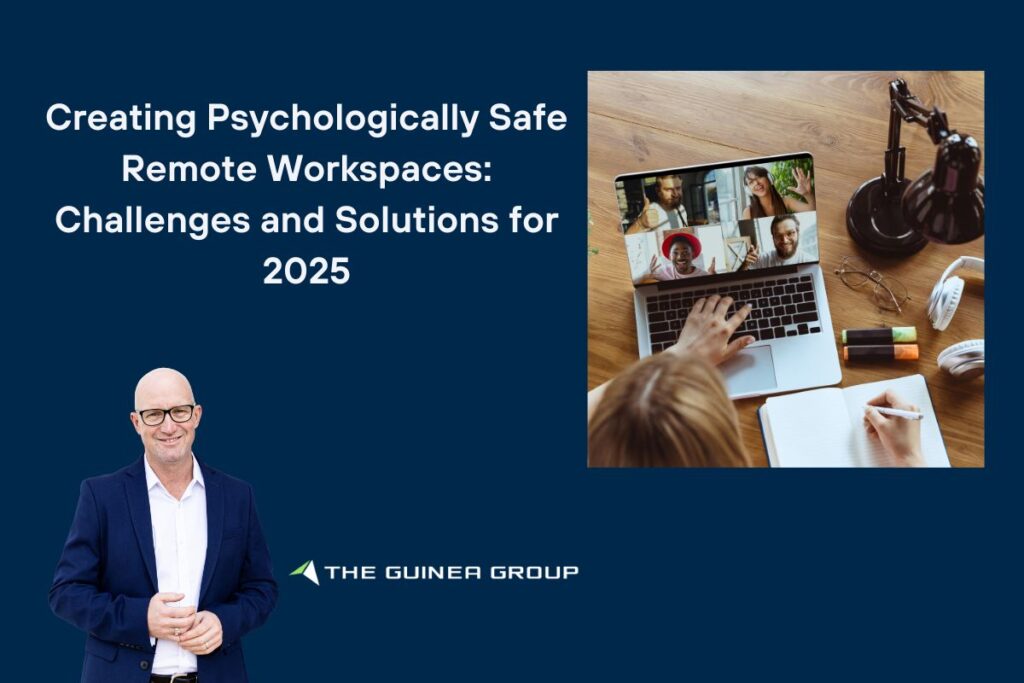Anton Guinea
Entrepreneur, Speaker, bestselling author, and founder of The Guinea Group of Companies. For over 15 years, Anton has helped leaders move their teams to become psychologically safe, physically safe and overall better versions of themselves.

Creating Psychologically Safe Remote Workspaces: Challenges and Solutions for 2025

Creating psychologically safe remote workspaces is both a challenge and an opportunity for leaders in 2025.
Psychological safety faces unique challenges in remote work. Limited non-verbal communication can lead to misunderstandings and escalate conflicts, while feelings of isolation may reduce trust and discourage employees from sharing ideas or concerns. Additionally, cultural differences and time zone barriers can complicate collaboration and delay feedback.
In a digital landscape, job insecurity can drive employees to overwork, fearing they must appear constantly available. Addressing these issues requires intentional efforts to foster trust, open communication, and inclusivity in remote teams.
Practical Solutions for Fostering Psychological Safety in Remote Teams
1. Build Trust Through Transparent Communication
Open and honest communication is the foundation of psychological safety. Leaders should prioritise clarity and consistency in their messaging.
How to Apply:
- Use collaborative platforms like Microsoft Teams to encourage real-time updates and discussions.
- Establish norms for virtual meetings, such as turn-taking and active listening, to ensure all voices are heard.
- Regularly share updates on team goals and progress to create a sense of alignment and trust.
2. Encourage Vulnerability and Empathy
Leaders play a critical role in setting the tone for openness. When leaders admit mistakes or share personal challenges, it fosters a culture of trust.
How to Apply:
- Begin meetings with an icebreaker or personal check-in to create a warm and inclusive atmosphere.
- Share stories of past failures and the lessons learned to normalise vulnerability.
3. Foster Equal Participation
Create opportunities for all team members to contribute, especially those who may feel hesitant in virtual settings.
How to Apply:
- Rotate facilitation roles during team meetings to empower different voices.
- Use breakout rooms for smaller, focused discussions where employees may feel more comfortable sharing.
4. Provide Clear Expectations and Support
Unclear expectations can lead to stress and uncertainty in remote work settings. Clear guidelines and ongoing support help employees feel secure and confident.
How to Apply:
- Set explicit goals and deadlines for projects to eliminate ambiguity.
- Offer resources, such as training or mentorship programs, to help employees meet expectations.
In 2025’s remote work landscape, psychological safety is a strategic necessity. It encourages innovation by fostering idea-sharing, boosts engagement through trust and motivation, and reduces turnover by making employees feel valued and supported.
What steps are you taking to build psychological safety in your remote teams? Share your thoughts—together, we can shape the future of work!
Please click the image below if you’d like to chat about what leadership means to you

If you would like to learn more about Anton or The Guinea Group, please click here to book into Anton’s calendar, to:
UPGRADE your Mindset
UPSKILL your Leadership
UPLIFT your Teams
About Anton
Anton has dedicated his working life to helping leaders to upgrade their mindset, upskill their leadership, and uplift their teams! With a focus on helps leaders to better lead under pressure. Anton is an entrepreneur, speaker, consultant, bestselling author and founder of The Guinea Group. Over the past 19 years, Anton has worked with over 175+ global organisations, he has inspired workplace leadership, safety, and cultural change. He’s achieved this by combining his corporate expertise, education (Bachelor of HR and Psychology), and infectious energy levels.
Work With Anton!
Subscribe to our Newsletter